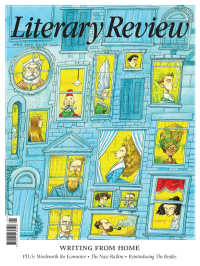James Riding
On Deaf Ears
Theft
By Luke Brown
And Other Stories 313pp £11.99
Britain 2016 and battle lines are being drawn. Love cools, friendships fall off, siblings divide and Paul, the bookish narrator of Luke Brown’s second novel, Theft, commits an act of gratuitous, destructive betrayal. His confession begins with an appeal to the enlightened empathy of the reader: ‘you have to understand the context.’
This is a test. Selling books and writing magazine columns have not made Paul more understanding or compassionate. (Nor did such activities help Liam, the unfaithful literary editor in My Biggest Lie, the author’s first novel.) Brown has no patience with the smug cliché that reading is intrinsically virtuous or its more insidious extension, that intellectuals are morally superior people. Instead, he suggests, perhaps the mendacity of fiction makes it a useful way of examining an angry era.
Flattery and self-indulgence have done well for Paul so far; he has cultivated ‘a teenager’s idea of a perfect life’ as a thirty-something hipster in Dalston. Then he loses his mother, his books column and his rent-controlled flat, and his sister disappears. The certainties of his youth destroyed, Paul deliberately

Sign Up to our newsletter
Receive free articles, highlights from the archive, news, details of prizes, and much more.@Lit_Review
Follow Literary Review on Twitter
Twitter Feed
Under its longest-serving editor, Graydon Carter, Vanity Fair was that rare thing – a New York society magazine that published serious journalism.
@PeterPeteryork looks at what Carter got right.
Peter York - Deluxe Editions
Peter York: Deluxe Editions - When the Going Was Good: An Editor’s Adventures During the Last Golden Age of Magazines by Graydon Carter
literaryreview.co.uk
Henry James returned to America in 1904 with three objectives: to see his brother William, to deliver a series of lectures on Balzac, and to gather material for a pair of books about modern America.
Peter Rose follows James out west.
Peter Rose - The Restless Analyst
Peter Rose: The Restless Analyst - Henry James Comes Home: Rediscovering America in the Gilded Age by Peter Brooks...
literaryreview.co.uk
Vladimir Putin served his apprenticeship in the KGB toward the end of the Cold War, a period during which Western societies were infiltrated by so-called 'illegals'.
Piers Brendon examines how the culture of Soviet spycraft shaped his thinking.
Piers Brendon - Tinker, Tailor, Sleeper, Troll
Piers Brendon: Tinker, Tailor, Sleeper, Troll - The Illegals: Russia’s Most Audacious Spies and the Plot to Infiltrate the West by Shaun Walker
literaryreview.co.uk